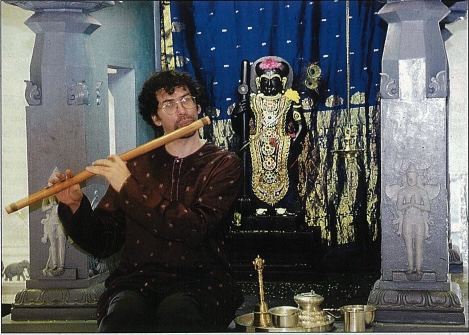In music today, the word fusion is widely used and loosely understood. It typically refers to the genre of fervid jazz-rock experiments that gained prominence in the 1970s. But it has since matured and expanded to include blending the music of disparate world cultures. It has been tempered with subtlety and nuance by classically trained artists. Many have attempted this melodic alchemy, and occasionally harmonies unite to create something exciting.
Master bansuri (bamboo) flute player John Wubbenhorst debuted in Hinduism Today with the release of Facing East [January, 1998]. There he took his Western classical and jazz training and incorporated Indian classical motifs and instruments. Facing East is highly successful fusion, though it leans slightly more to the West. In his latest recording, Bansuri Dreams (us$15.00, 59 minutes, Drimala Records, 2000), Wubbenhorst takes a delightfully Eastern approach. He gives an elated voice to the extensive Indian classical training he received at the feet of Hari Prasad Chaurasia during years of study in India.
Dreams consists of solo bansuri improvisations. Eight evocative selections subtly fuse contemporary Western harmonies and meditative melodic lines with Indian raga forms. Wubbenhorst overdubs flute parts, adds demure synthesizer backgrounds and on several tracks has percussionists Ken Anoff and Steve Bloom add earthy rhythms. Collectively, they weave an immensely appealing tapestry of sound. So subtle is Dream’s fusion that a casual listener may just hear “Indian music,” but Wubbenhorst has added much more. Drimala’s president and executive producer, Philip Egert, told Hinduism Today he hopes to “show the path to tomorrow, to document the sounds not yet heard, not being captured.”
Wubbenhorst succeeds well in looking east. Meanwhile, many Indian classical musicians have struggled to face west at one time or another. Regrettably, most of their experiments have sounded…well, like experiments. Two exceptions come from India’s eminent maestros, Hari Prasad Chaurasia and Zakir Hussain. Chaurasia’s Music of the Rivers and Hussain’s Music of the Deserts (Music Today’s Sound Scapes series, 1993) reveal another way fusion is civilizing. These recordings maintain an Indian character, but with a mature Western undertone that gives them modern energy and allure. Chaurasia’s Rivers is a must-have, especially for jazz fans who would like to hear what Indian music can offer the West. Hussain keeps the flavor of rustic desert music while integrating digital samples, synthesizers and multitracking into very danceable rhythms.
The world of fusion can be risky and unpredictable. But successful musical chemists like these are well worth seeking out.
Drimala Records, Post Office Box 69055 Hampton, Virginia 23669 USA. tel: 757.722.1154 fax: 757.722.3898. www.drimala.com;
e-mail: backoffice@drimala.com
Music Today, 404 Park Avenue South, New York, New York 10016 USA.
e-mail: livinmedia@aol.com
RESOUNDING REBELLION
Carnatic classical violinist, L. Subramaniam, has boldly redefined musical fusion with the release of an authentic and successful merger of musical traditions. Global Fusion (us$16.97, 48 minutes, Detour/Atlantic Records, 1999) is a refreshing, innovative production. On each track, Subramaniam fuses his precision bowing with expert artists from several world traditions. Each song is a meeting of musical masters. Some are poignant duets. Other tracks feature exotic and exhilarating ensembles.
Fusion begins with Jai Hanuman!, an extraordinary composition built around the Balinese kecak, or monkey dance that involves a large choir of men who chant, sing and clap in intricate rhythmic unison. Subramaniam honors their expert tradition and, with the inclusion of Jorge Struntz on Spanish guitar and K. Sekar on tavil, creates a powerful musical experience. He weaves similar magic on the other tracks, featuring Japanese koto maestro, Miya Masaoka, Jie Bing Chen on the Chinese erhu and the stellar voice of Kavita Krishnamurti.
Atlantic Records, 1290 Avenue of the Americas, New York, New york 10104 USA. tel: 212.405.5470. www.erato.com.
